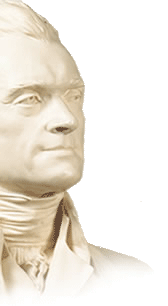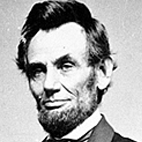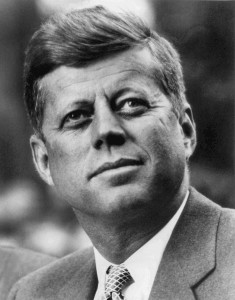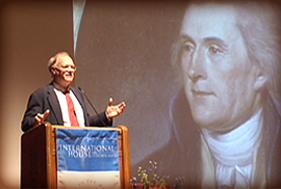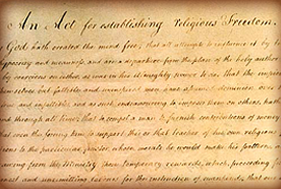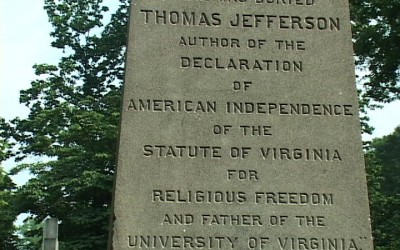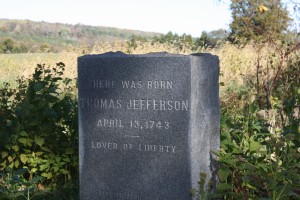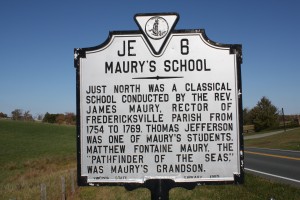About Thomas Jefferson
“Thomas Jefferson had a charm of manner and conversation that passes all description – so cheerful – so unassuming – so free, and easy, and frank, and kind, and gay – that even the young and overawed and embarrassed visitor at once forgot his fears and felt himself by the side of an old and familiar friend. There was no effort, no ambition in the conversation of the philosopher. It was as simple and unpretending as nature itself. And while in this easy manner he was pouring out instruction, like light from an inexhaustible solar fountain, he seemed continually to be asking, instead of giving information. The visitor felt himself lifted by the contact into a new and nobler region of thought, and became surprised at his own buoyancy and vigor. He could not, indeed, help being astounded, now and then, at those transcendent leaps of the mind, which he saw made out without the slightest exertion.
And there seemed to be no end to his knowledge. He was a thorough master of every subject that he touched. There seemed to be no longer any terra incognita of the human understanding; for, what the visitor had thought so, he had now found reduced to a familiar garden walk; and all this carried off so lightly, so playfully, so gracefully, so engagingly, that he won every heart that approached him, as certainly as he astonished every mind.”
United States Attorney General William Wirt
Tribute to Thomas Jefferson (1826)
Our country is fortunate that we can draw guidance from an extraordinary wellspring of wisdom–the vision of Thomas Jefferson. President Jefferson was the founder and leader who was best able to articulate our nation’s highest ideals and lay the foundation for America’s hope and promise. His perseverance and genius helped consolidate the victory of the American Revolution and his legacy is surprisingly relevant today.
In this lecture at the University of Chicago International House, Eric presents “The Vision of Thomas Jefferson for Today’s America”.
Appreciating Thomas Jefferson
Contemporary
“Let me describe to you, a man, not yet forty, tall, and with a mild and pleasing countenance, but whose mind and understanding are ample substitutes for every exterior grace. An American, who without ever having quitted his own country, is at once a musician, skilled in drawing; a geometrician, an astronomer, a natural philosopher, legislator, and statesman.”
–Marquis de Chastellux: “Travels in North America in the Years 1780-81-82”
Contemporary-1899
“All honor to Jefferson—to the man who, in the concrete pressure of a struggle for national independence by a single people, had the coolness, forecast, and capacity to introduce into a merely revolutionary document, an abstract truth, applicable to all men and all times, and so to embalm it there, that to-day, and in all coming days, it shall be a rebuke and a stumbling-block to the very harbingers of re-appearing tyranny and oppression.”
The principles of Jefferson are the definitions and axioms of free society.”
– Abraham Lincoln: Letter to H.L. Pierce, April 6, 1859.
1900-present
“I think this is the most extraordinary collection of talent, of human knowledge, that has ever been gathered together at the White House, with the possible exception of when Thomas Jefferson dined alone.”
–John F. Kennedy: April 29, 1962, Remarks at a White House dinner honoring Nobel Prize Winners.
more appreciation 1900-present
Explore Jefferson's World
Reading List
A selected list of books containing Thomas Jefferson’s writings and books about Thomas Jefferson. Most are still in print.
Useful links
These links access digital Jeffersonian archives, providing valuable resources and general information.
Chronology
| 1743 | Born April 13 in Virginia at Shadwell, near Charlottesville, the son of Peter Jefferson and Jane Randolph. |
| 1757 | Father dies. |
| 1758 | Attends Reverend Maury’s school. |
| 1760 | Enters the College of William and Mary. |
| 1762 | Graduates from college and begins law studies under George Wythe at William and Mary. |
| 1767 | Commences seven-year legal practice. |
| 1769 | Elected to the Virginia House of Burgesses, serving until 1775. |
| 1769 | Begins building Monticello from his own architectural design. |
| 1772 | Marries Martha Wayles Skelton. |
| 1773 | Key organizer of Committees of Correspondence with other colonies. |
| 1774 | Writes “A Summary View of the Rights of British America.” |
| 1775 | Elected Virginia delegate to the Continental Congress in Philadelphia. |
| 1776 | Writes the Declaration of Independence. |
| 1776 | Elected Albermarle County representative in the Virginia House of Delegates. |
| 1776 | Drafts a proposed constitution for Virginia. |
| 1779 | Completes proposed revision of a substantial portion of Virginia’s statutes. |
| 1779 | Elected wartime governor of Virginia and after reelection serves two years. |
| 1782 | Wife, Martha, dies having borne six children, two of whom survive infancy. |
| 1782 | Writes substantial portions of his only book, “Notes on the State of Virginia.” |
| 1783 | Serves as a Virginia delegate in Congress. |
| 1784 | Drafts “Report on Government for Western Territory.” |
| 1784 | Sent by Congress to Paris to negotiate commercial treaties. |
| 1785 | Appointed Minister to France, succeeding Benjamin Franklin. |
| 1786 | Virginia enacts Jefferson’s “Statute for Religious Freedom.” |
| 1786 | Tours England. |
| 1787 | Tours southern France and northern Italy. |
| 1788 | Tours Netherlands and the Rhineland. |
| 1789 | Witnesses the opening events of the French Revolution. |
| 1790 | Appointed Secretary of State by George Washington. |
| 1794 | Returns to farming and rebuilds Monticello. |
| 1796 | Elected Vice President of the United States under John Adams. |
| 1797 | Elected President of the American Philosophical Society, serving until 1819. |
| 1798 | Drafts Kentucky resolutions declaring unconstitutional the federalist’s Alien and Sedition acts. |
| 1801 | Elected third President of the United States. |
| 1803 | Concludes Louisiana Purchase and mounts the “voyage of discovery” of the new land under Merriwether Lewis. |
| 1805 | Reelected President. |
| 1806 | Begins construction of second home at Poplar Forest, Bedford County, Virginia. |
| 1807 | Implements Embargo Act, seeking to use economic coercion to avoid war with Great Britain. |
| 1808 | Declines a third term as President. |
| 1809 | Retires to Monticello. |
| 1815 | Sells his library to the United States forming the foundation of the Library of Congress. |
| 1819 | Founds the University of Virginia. |
| 1819 | Completes “The Life and Morals of Jesus of Nazareth” for personal use. |
| 1820 | Protests the Missouri Compromise. |
| 1821 | Writes “Autobiography” for his family. |
| 1823 | Advocates the policy underlying the Monroe Doctrine. |
| 1825 | University of Virginia admits first students. |
| 1826 | Dies on July 4 at Monticello. |
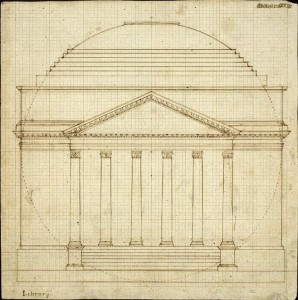
Thomas Jefferson’s draft of the “South Elevevation of the Rotunda” at the University of Virginia. Courtesy, The Library of Congress.

Jefferson’s Draft Constitution for Virginia. Note at the bottom of the page, “No person hereafter coming into this country shall be held in slavery under any pretext whatever.” (Courtesy the Library of Congress)

Jefferson’s Original Rough Draft of the Declaration of Independence. Click here to see the complete Rough Draft and Jefferson’s ringing denunciation of slavery on page 3 (Courtesy the Library of Congress)

An Act for Establishing Religious Freedom (May not be reproduced without written permission from the Library of Virginia, www.lva.virginia.gov)
